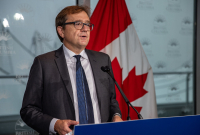Support strong Canadian climate journalism for 2025
David Kennedy says his recent retirement came as a lifestyle shock, especially financially.
The 67-year-old Nanaimo, B.C., man said he faced housing difficulties after retirement, and with the high cost of food and fuel, every month is financially challenging.
The B.C. government introduced legislation Tuesday setting 10-year targets to substantially reduce poverty in the province, focusing on children, while also making a first-time commitment to cut seniors' poverty by 50 per cent.
The legislation would change three laws to set higher targets to cut poverty, ease employment requirements for people on income and disability assistance and provide more supports for people, said Sheila Malcolmson, social development and poverty reduction minister.
The amending legislation commits B.C. to cut the overall poverty by 60 per cent over the next decade, including reducing child poverty by 75 per cent and seniors' poverty by 50 per cent.
Kennedy said he backs any government change to help him increase his income and offer support.
"I'm a recent senior and I found out the difficulty of the housing market," he said at a news conference with Malcolmson and other people facing poverty issues. "I wasn't ready for that."
Local advocates helped him find a place to rent, but daily life continues to be a struggle, said Kennedy.
"Anything that helps," he said. "I've found that what I've got coming in from pensions and stuff makes it really rough to try and make ends meet monthly. It's part of your thinking all the way. You're always having to make up for that amount that isn't coming in."
Malcolmson said the province has exceeded its original poverty reduction goals set in 2018 to reduce the overall poverty rate in B.C. by 25 per cent and child poverty by 50 per cent.
The government's most recent report on poverty reduction said that since 2021 B.C.'s total poverty rate dropped by 45 per cent from 2016 levels and child poverty is down by 54.6 per cent.
But the report said there were still 447,000 people in poverty in 2021, including 70,000 children
"But we know anecdotally that people are under considerably more pressure than they were in 2021," Malcolmson said. "The need for us to do more is absolutely clear."
She said more people are using food banks, the number of people on income assistance is rising and emergency assistance grant applications have increased.
"All those metrics tell us people are hurting more than in 2021," said Malcolmson. "That's why we're deepening our efforts."
She said the legislation does not come with increases in government assistance or disability rates, which the NDP government has raised five times since 2017.
Malcolmson said the government is preparing to release its poverty reduction strategy later this year and suggested assistance rate increases could be included.
"We're always trying to move the dial," she said.
Green Party Leader Sonia Furstenau said she will push for an immediate raise in disability and income assistance rates.
"At a time when people on disability and income assistance are falling far below the poverty line, this bill adds even greater bureaucratic demand with no recognition of the way in which these assistance programs are trapping people in poverty," she said in a statement.
"We need entirely new thinking around how people with disabilities and on income assistance are served so programs are a path out of poverty and not a prison."
This report by The Canadian Press was first published March 5, 2024.




Comments